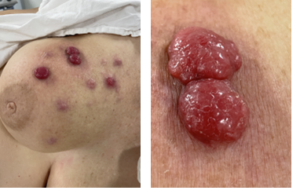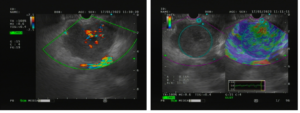US Quiz of the Month – Janeiro 2024
Case Report
We present the case of a 77-year-old woman with a history of Merkel cell carcinoma (MCC) of the right arm, who underwent surgical resection and chemotherapy for the initial lesion. During routine surveillance, a breast skin recurrence was detected and subsequently confirmed by tissue biopsy (Figure 1).

Figure 1.– Cutaneous right breats recurrence of Merkel Cell Carcinoma
Further imaging was performed as part of ongoing surveillance, which revealed a mass in the head of the pancreas. Endoscopic ultrasound (EUS) revealed a lobulated and heterogeneous solid lesion, predominantly hypoechoic, with irregular boundaries and contours, measuring 52.6×38.2mm. (Figure 2) The lesion showed intense vascularity on Doppler study. Within it, there is a pericentimetric anechoic area, suggestive of necrosis. On elastography, it exhibited predominantly blue pattern with a strain ratio (SR) of 11.6. Contrast-enhanced ultrasound (CEUS) using SonoVue revealed diffuse early arterial contrast uptake, which persists during the venous phase.

Figure 2.– Endoscopic ultrasound image showing a) 52.6×38.2mm lobulated and heterogeneous solid lesion, predominantly hypoechoic, with irregular boundaries and contours; b) elastography evaluation.
What is the most likely diagnosis?
Discussion:
A fine-needle biopsy was performed, confirming the diagnosis of a pancreatic metastasis from MCC.
Merkel cell carcinoma is a rare and aggressive skin cancer with a high potential for recurrence and distant metastasis. 1 The most common sites of MCC metastasis are regional lymph nodes, liver, lungs, bones, and brain. However, metastasis to the pancreas is rare. 2
The patient’s clinical history of prior surgery and chemotherapy for MCC, followed by a breast skin recurrence and subsequently a pancreatic metastasis, underscores the importance of close surveillance and appropriate investigation in patients with a history of MCC.
In conclusion, this case highlights the potential for MCC to metastasize to uncommon sites, such as the pancreas, and the use of elastography in the evaluation of MCC metastasis. Healthcare providers should be aware of the potential for MCC metastasis and consider appropriate monitoring strategies, particularly in patients with a history of MCC. Further studies are needed to evaluate the utility of elastography in the diagnosis and management of MCC metastasis.
References:
1 – Nguyen JH, et al. Merkel Cell Carcinoma: A Comprehensive Review. J Am Acad Dermatol. 2019 Jul;81(1):1-17.
2 – Horikawa Y, et al. Merkel cell carcinoma with pancreatic metastasis: a case report and literature review. Pancreatology. 2016;16(6):729-732.
Authors:
João Afonso1,2, Pedro Cardoso1,2, Pedro Moutinho Ribeiro1,2; Rosa Coelho1,2; Guilherme Macedo1,2
1 – Gastroenterology Department, Centro Hospitalar Universitário São João, Porto, Portugal
2 – Faculty of Medicine of the University of Porto, Porto, Portugal


